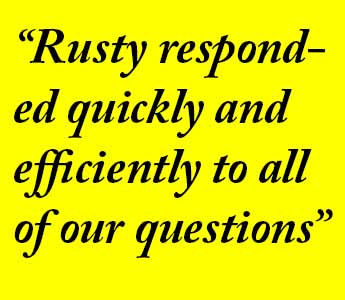Cost
Inspection fees vary by type of home, size and year built. See fee guidelines listed in the SERVICES link in the site.
Time
Inspection time will vary by the type of house and type of inspection; generally budget 2 hours for a condo and 3 hours for a townhouse and single family house.
Report
With few exceptions Inspection reports are emailed the next day. All reports are PDF and transmitted via email.
Payment
Check to Russell Layton Associates, PayPal, Venmo, or Zelle are options. See PAYMENT link in the site.
Scheduling
I need the inspection address, your name and email, agent name and email and day and time of the inspection. You can provide this information by email, text or scheduling form.
Inspection Overview
Home inspection evaluations are home inspector professional judgements based on home inspection standards and observations, not contractor standards. Deductive reasoning and fairness is applied; it is not fair to compare older homes with new construction standards related to issues. Each home has unique conditions relative to the era in which it was built. The home inspection is not a code authority evaluation nor is a home required to be updated to current standards. The home inspector is not a professional engineer, does not provide engineering or architectural services or analysis and does not offer a professional judgement about the adequacy of any structural system or component.
Inspecting and Reporting Parameters
Repair / Not Functioning Properly
Damaged, decayed, not functioning properly, out of order, worn out or missing; often requiring evaluation and repair by a qualified service contractor.
Update Maintenance
A protective maintenance task of some sort required to reduce the risk of more serious problems.
End of Service Life
A replacement expense expected at some point because of condition, quality, age and average service life.
Improve
Update to improve energy efficiency, function, reduce maintenance requirements, or reduce liability and safety risks.
Marginal
Lower limit of acceptability and functionality; improvement costs and expenses expected.
Limited Inspection
Unknown conditions and inspection limitations requiring use, additional inspection, specialist, contractor, engineer or other professional evaluation beyond the scope of the home inspection.
Further Evaluation / Not Inspected
Evaluation is beyond the scope of the home inspection to determine function or if a condition requiring a repair is necessary.
Inspection Procedures
Electrical Inspection
Inspect the electric service to the house, identify the location of the service panel and the main disconnect; determine the grounding system method and the overcurrent protection devices used; determine if the main service panel amperage rating is sufficient; identify the predominant branch circuit wiring method; test a representative amount of receptacles; check switches and lighting fixtures; inspect the electric service panel; test ground fault receptacles (GFI) for proper function.
Plumbing Inspection
Test the plumbing system by checking fixtures, flushing toilets and running faucets; check for leaks and water flow; drain operation; inspect toilets, sinks, showers, and major appliances for leaks; describe the main water entry pipe material and identify the main water valve location; determine the materials used for the water, drain and waste pipes; inspect the water heater, determine its approximate age and service life; identify gas pipe materials and fuel shut off valve locations; identify gas venting methods.
Heating Inspection
Test the heating system response to the thermostat control; inspect the heating equipment and heat distribution; inspect vents, flues, and chimneys for any obvious defects; identify the fuel source and heating system type; determine the approximate age of the heating equipment and average service life.
Air Conditioning Inspection
Test the air conditioning system response to the thermostat control in temperatures above 60 degrees; describe the cooling distribution; determine the approximate age of the cooling equipment and average service life; air filters; identify the location of the condensation water drain; check to make sure that the exterior unit is level, clear of obstructions and the refrigerant line insulation is in place; check to ensure that each room has air conditioning vents.
Foundation and Framing Inspection
Inspect the foundation and identify the type of materials used; check for cracks and visible deficiencies; check for water seepage, moisture marks and stains; inspect the framing and identify the components used for the floor structure, wall structure, and framing; identify observed wood boring insects; determine if there is a sump pump system; check for insulation, vapor barriers and ventilation methods.
Kitchen Inspection
Test the kitchen appliances by using normal operating controls to activate the primary function of each appliance; determine the kitchen ventilation method; evaluate the cabinets and countertops for significant issues; test each receptacle and determine if there is GFI protection and function; identify the GFI re-set location.
Laundry Inspection
Identify the laundry location; determine the exit location and condition of the dryer vent; identify the type of dryer exhaust vent pipe material; check for the presence of a leak containment system or water shut off system; test the laundry sink; identify the dryer fuel source; identify the type of washer supply hoses.
Interior Inspection
Check a representative sampling of window operation; walls and ceilings are inspected for water stains and leaks under bathrooms, kitchens, roof coverings and flashing areas albeit there may be a leak not observed or concealed; check for wall and ceiling damage; check door operation; Identify the presence of smoke alarms, carbon monoxide alarms; check stairways and railings; check floor coverings for significant deficiencies.
Fireplace and Chimney Inspection
Identify the locations and types of wood burning fireplaces, gas fireplaces, chimneys; check mortar condition; check the chimney for significant issues; check the fireplace for loose mortar; operate the damper; determine venting methods for gas fireplaces.
Bathroom Inspection
Test the bathroom fixtures by running water for a period of time through each fixture in each bath; toilets are flushed; drainage and water flow are observed and evaluated; check for faucets and fixture leaks; check drainage; check caulking and grouting at tubs, showers and floors; test GFCI protected receptacles and identify the GFI re-set location; check conditions of tub and shower walls and surrounds. Identify ventilation type and function; determine heat source presence.
Attic Inspection
Describe the type of attic inspection method; identify the type of attic access and the attic, sheathing, framing methods and materials; check for leaks albeit there may be leaks not observed or concealed; check the insulation; identify the insulation materials; identify the absence of insulation; describe the attic ventilation system; identify the presence of vapor barriers; identify the type of townhouse fire separation walls; check for pest intrusion evidence.
Exterior Inspection
Inspect and describe the wall covering materials; check the eaves, fascia, soffits and trim for deficiencies; check protection, painting, sealants and caulking for deficiencies and maintenance requirements; identify the presence and locations of exterior doors, light fixtures, and faucets; test GFI receptacles and identify GFI re-set locations.
Roof and Flashing Inspection
Describe the roof inspection method; describe the roof type; inspect the roof coverings; identify the roof covering material; approximate the age of the roof coverings and average service life; check flashings; check roof penetrations, vent pipe collars, skylights and flues; check sealants and caulking.
Grounds and Attachments Inspection
Inspect the entry walks, steps, stoops and railings; inspect the rear and side steps and railings; describe type and location of porches; check decks and railings for significant deficiencies; check driveway and retaining walls for significant issues and describes materials for each; check vegetation for adverse conditions to home.
Grading and Drainage Inspection
Describe the grading and drainage observations; check for significant deficiencies; identify the presence of window wells; describe the optimum specifications for grading against the foundation.
Not Included or Required
The condition of systems or components that are not readily accessible
The remaining life of any system or component
The strength, adequacy, effectiveness, or efficiency of any system or component
The causes of any condition or deficiency
The methods, materials, or costs of corrections
Future conditions including failure of systems and components
The suitability of the property for any specialized use
The market value of the property or its marketability
The advisability of the purchase of the property
The presence of diseases harmful to humans or potentially hazardous plants or animals including wood destroying organisms and mold
The presence of any environmental hazards including toxins, carcinogens, noise, asbestos, lead-based paint, mold, radon, and contaminates in soil, water, and air
The effectiveness of any system installed or methods utilized to control or remove suspected hazardous substances
The operating costs of systems or components
The acoustical properties of any system or component
The presence of components involved in manufacturer's recalls
The inspection of outbuildings
The home inspection does not include a review for compliance with regulatory requirements (Virginia Uniform Statewide Building Code or other codes, regulations, laws, ordinances, etc.).


